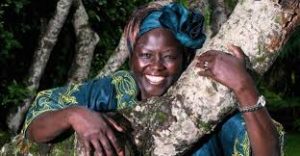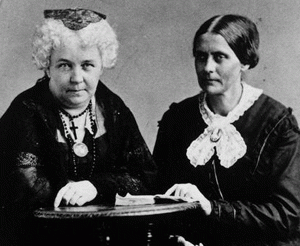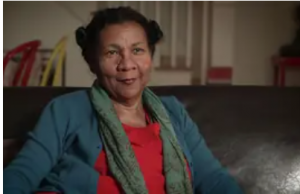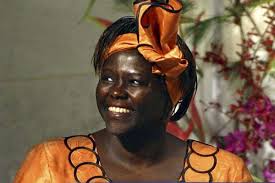
Wangari Muta Maathai, an African woman of Kenyan descent was born in Nyeri, a rural area of Kenya in 1940.
She obtained a degree in Biological Sciences from Mount St. Scholastica College in Atchison, Kansas (1964), a Master of Science degree from the University of Pittsburgh (1966), and pursued doctoral studies in Germany and the University of Nairobi, before obtaining a Ph.D. (1971) from the same University where she also taught veterinary anatomy.
She is the first woman in East and Central Africa to earn a doctorate degree; and later on chair of the Department of Veterinary Anatomy and an associate professor in 1976 and 1977 respectively. In both cases, she was the first woman to attain those positions in the region.
Wangari Maathai was active in the National Council of Women of Kenya between 1976–1987 and was its chairman between 1981–1987. While serving in the National Council of Women in 1979, Professor Maathai introduced the idea of community-based tree planting and continued to develop this idea into a broad-based grassroots organization called the Green Belt Movement (GBM), whose main focus is poverty reduction and environmental conservation through tree planting.
Professor Wangari Maathai was earned international acknowledgement and recognition for her struggle for democracy, human rights, and environmental conservation and served on the board of many organizations. She addressed the UN on a number of occasions and spoke on behalf of women at special sessions of the General Assembly during the five-year review of the Earth Summit. She served on the Commission for Global Governance and the Commission on the Future.
Professor Maathai represented the Tetu constituency in Kenya’s parliament between 2002–2007, and served as Assistant Minister for Environment and Natural Resources in Kenya’s ninth parliament between 2003–2007.
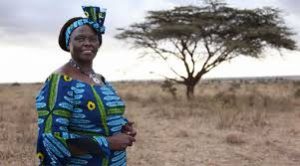 She was appointed Goodwill Ambassador to the Congo Basin Forest Ecosystem by the eleven Heads of State in the Congo region in 2005; and the following year 2006; she founded the Nobel Women’s Initiative with her sister laureates Jody Williams, Shirin Ebadi, Rigoberta Menchú Tum, Betty Williams, and Mairead Corrigan.
She was appointed Goodwill Ambassador to the Congo Basin Forest Ecosystem by the eleven Heads of State in the Congo region in 2005; and the following year 2006; she founded the Nobel Women’s Initiative with her sister laureates Jody Williams, Shirin Ebadi, Rigoberta Menchú Tum, Betty Williams, and Mairead Corrigan.
In 2007, Professor Maathai was invited to be co-chair of the Congo Basin Fund; an initiative by the British and Norwegian governments to help protect the Congo forests.
Apart from the Nobel Laurette Peace Price she won in 2004, in recognition of her deep commitment to the environment, the United Nations (UN) Secretary-General named Professor Maathai ‘the United Nation’s Messenger of Peace’ in December 2009, with a focus on the environment and climate change. In 2010 she was appointed to the Millennium Development Goals Advocacy Group: a panel of political leaders, business people and activists established with the aim to galvanize worldwide support for the achievement of the MDGs.
In 2010, Professor Maathai became a trustee of the Karura Forest Environmental Education Trust; established to safeguard the public land for whose protection she had fought for almost twenty years. And that same year, in partnership with the University of Nairobi, she founded the Wangari Mathai Institute for Peace and Environmental Studies (WMI).
The WMI will bring together academic research—e.g. in land use, forestry, agriculture, resource-based conflicts, and peace studies—with the Green Belt Movement approach and members of the organisation.
She authored four books:
The Green Belt Movement
Unbowed: A memoir
The challenge of Africa
Replenishing the Earth
In its citation about Professor Wangari Mathai during the award of the Nobel Peace Prize, the Norwegian Nobel Committee noted Professor Maathai’s contribution to “sustainable development, democracy and peace.” The Committee further stated that Professor Maathai “stands at the front of the fight to promote ecologically viable social, economic and cultural development in Kenya and Africa. She has taken a holistic approach to sustainable development that embraces democracy, human rights and women’s rights in particular. She thinks globally and acts locally.”
In accepting the award, Professor Maathai said: “I believe the Nobel committee was sending a message that protecting and restoring the environment contributes to peace; it is peace work. I always felt that our work was not simply about planting trees. It was about inspiring people to take charge of their environment, the system that governed them, their lives, and their future.”
Professor Wangari Maathai died on 25 September 2011 at the age of 71 after a battle with ovarian cancer.
